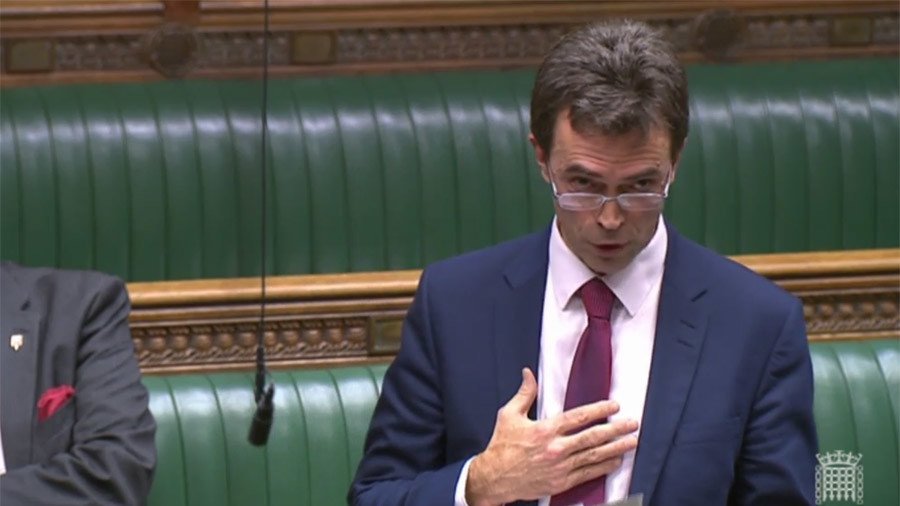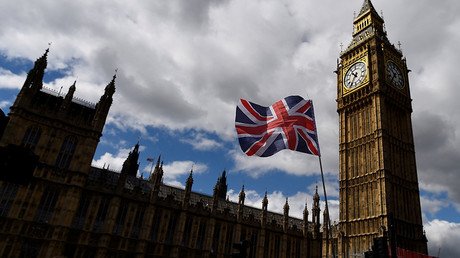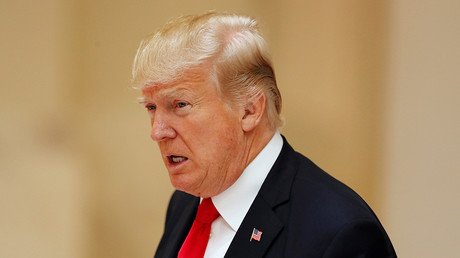Brexit? Blame it on the Bolsheviks! MPs’ Russian interference debate echoes ‘Red Menace’ of old

In a debate titled “Russian interference in UK politics and society,” Parliament saw literally tens of MPs packed like sardines into a chamber built for hundreds. Sardines with lots of legroom and space to spread, as several did.
The poorly attended (come on, it is almost Christmas) debate was called by Tom Brake, who is one of the rarer sights in the House these days – a Liberal Democrat MP. When there’s so few of your party in Parliament, jumping on a helpful bandwagon is one way of getting 15 minutes to speak - and alleged Russian interference in the Brexit vote via social media is one of the fastest, most-popular bandwagons you’ll find at the moment.
In his opening gambit Brake declared that “Russia is a clear and present danger, and presents a threat to our democracy,” before asking: “Why do I make this alarmist statement about Russia?” Which is a pretty good question, and showed a rare moment of self-reflection.
One answer is because, according to Brake, “Russia has a history of interference.” You could almost hear ghostly chuckles from the ancient walls of a parliament which stood at the center of the largest empire in history, and has voted to do a fair bit of interfering itself in recent years, usually of the exploding missile type.
But is it fair to bring up this kind of history, and isn’t it childish to hold that against Britain today in a debate on a completely different subject? Well, one bearded Labour MP interjected to wonder whether whatever is happening today has been the pattern “since the Bolshevik coup 100 years ago.” He looked pretty happy with himself at that one, and sat back smugly, content his knowledge of history had been displayed to the world. It’s knowledge of the present which is more concerning.
Brake said he’ll concentrate on recent activity if that’s OK, namely tweets and Facebook. He then went on to repeat the findings of a number of studies which however many times they’re repeated still do not prove Russian-based tweets affected the Brexit vote. This writer is getting a little bored of regurgitating them, so won’t this time if you don’t mind.
The evidence is so thin, MPs (and Brake is no different here) actually fall back on accusations related to the US elections, and even the French. Is all this a desperate plea for attention?
“This is not just about Russia,” the Lib Dem insisted, during a debate which had ‘Russia’ in the title.
Brake gave the usual lecture to his colleagues about appearing on RT, saying the only time MPs should appear on the Russian channel is if “they have complete control, are completely unedited, they can go on there, they can say what they want so it’s not going to get chopped, cut by RT.”
It’s truly baffling. How many MPs who have been on RT and been given the freedom to say what they want will it take before their colleagues start to notice. Could it possibly be that people like Tom Brake who are throwing these accusations don’t actually watch?
Brake said: “The only time RT contacts me is when I’ve said something critical about the government.” He’s the opposition! When else would a news channel contact him? Is he angry RT forgot his birthday?
“I do run the risk of coming across as a conspiracy theorist... But we do not know the extent of [interference] because no one has investigated it properly.” Well yes, it’s certainly a risk!
"Conspiracy theorist" @thomasbrake admits he doesn't want to become known for conspiracy theories as he debates Russia in @HouseofCommons. pic.twitter.com/kvcWbhYgq8
— RT UK (@RTUKnews) December 21, 2017
Brake is not happy that some MPs have been targeted on Twitter. Then just after the debate, he took the opportunity to target a Russian diplomat on Twitter. Tit-for-tat, I suppose.
Spoken in my debate highlighting Russian interference in UK politics. The debate was enlivened by a Russian diplomat filming, against the rules, the debate from the public gallery and being asked to leave. He could just have watched it on Parliament TV.
— Tom Brake (@thomasbrake) December 21, 2017
Joining the debate after Brake were two MPs that would struggle to fill their day if it wasn’t for a nice spot of criticizing Russia after lunch. First was Damian Collins MP, chair of the committee in charge of investigating tweets from Russia. He continued to froth that social media platforms just weren’t coming up with the kind of evidence he desperately wants to see, whether it exists or not.
Next to stand up was Ben Bradshaw MP, who has made anti-Russian sniping from the backbenches his main pastime now his ministerial days are far behind. No one could accuse him of going over the top with his criticism. He gently jibed that Russia is a “nasty, nationalistic, ultra-conservative, corrupt kleptocracy. It’s racist, it’s homophobic, and it makes no secret of wanting to undermine our democracy.” He’s sooo sweet.
Perhaps after that rant, it was good that next to speak was Conservative Sir Edward Leigh, who suggested MPs should keep a sense of proportion in the debate around Russia (Bradshaw probably missed that bit).
He seemed dismayed that “the paranoid tendency to see reds under the bed is very much alive, albeit changed. There is an explanation for this paranoia. Look at Trump’s victory, and the success of Brexit and the referendum. Things are not going the way of liberals and their world view, and they just can’t accept that people, the workers even, the workers are abandoning their ideology,” he said. “The left has a psychological need to find some excuse… Russia is that excuse today.”
I think you will find it easier to dig up evidence to back that conclusion.














